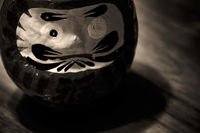
If you click on the title of this post, you'll be directed to the original Wikipedia article, which contains more pictures of Daruma dolls, and links, etc.
Daruma doll
From Wikipedia, the free encyclopedia
Other meaning, Daruma is the Japanese name for Bodhidharma.
Daruma (達磨 or だるま) also refers to a hollow and round Japanese wish doll with no arms and legs, modelled after Bodhidharma. Typical colors are red (most common), yellow, green, and white. The doll has a face with a moustache and beard, but its eyes only contain the color white. Some dolls have written characters on the cheeks explaining the kind of wish or desire the owner has in mind, such as protection of loved ones. The surname of the owner may be written on the chin.
Daruma dolls are typically purchased in or near Japanese Buddhist temples and can range in price from 1000 yen for small dolls (~15cm in height) to 10,000 yen or more for the largest dolls (~60cm in height). It is normal to own only a single daruma at a time.]
Making a wish
Using black ink, one fills in a single circular eye while thinking of a wish. Should the wish later come true, the second eye is filled in. Until then the daruma is displayed in a high location in one's home, typically close to other significant belongings such as a Butsudan (a Buddhist praying box).
If the daruma doll was purchased within a temple, the owner can return it for burning. Dolls purchased at a temple are often marked; most temples will refuse to burn dolls not exhibiting the temple's mark. Burning usually occurs at the year's end. This is done as a purification ritual to let kami know that the wisher did not give up on the wish, but is another path to make it come true.
The daruma doll will maintain balance and will remain centred. Even when it is tilted either side it will regain the balance. Implicaton of this is spiritual. It is symbolic. One may go to past or future thoughts, but one has to live in Present. Here and Now.]
Controversial aspects
In the late 1990s, several groups of human rights activists claimed that the practice of making Daruma without eyes (and the practices associated with them) is discriminatory against the blind. Although whether anyone actually found this custom offensive is debatable, media organizations and politicians eager to show support of political correctness stopped showing eyeless daruma altogether. It used to be a signifying moment in an election to have the winner draw an eye, but this is no longer shown. Such scenes are now deleted from recaps of previous elections as well.
No comments:
Post a Comment